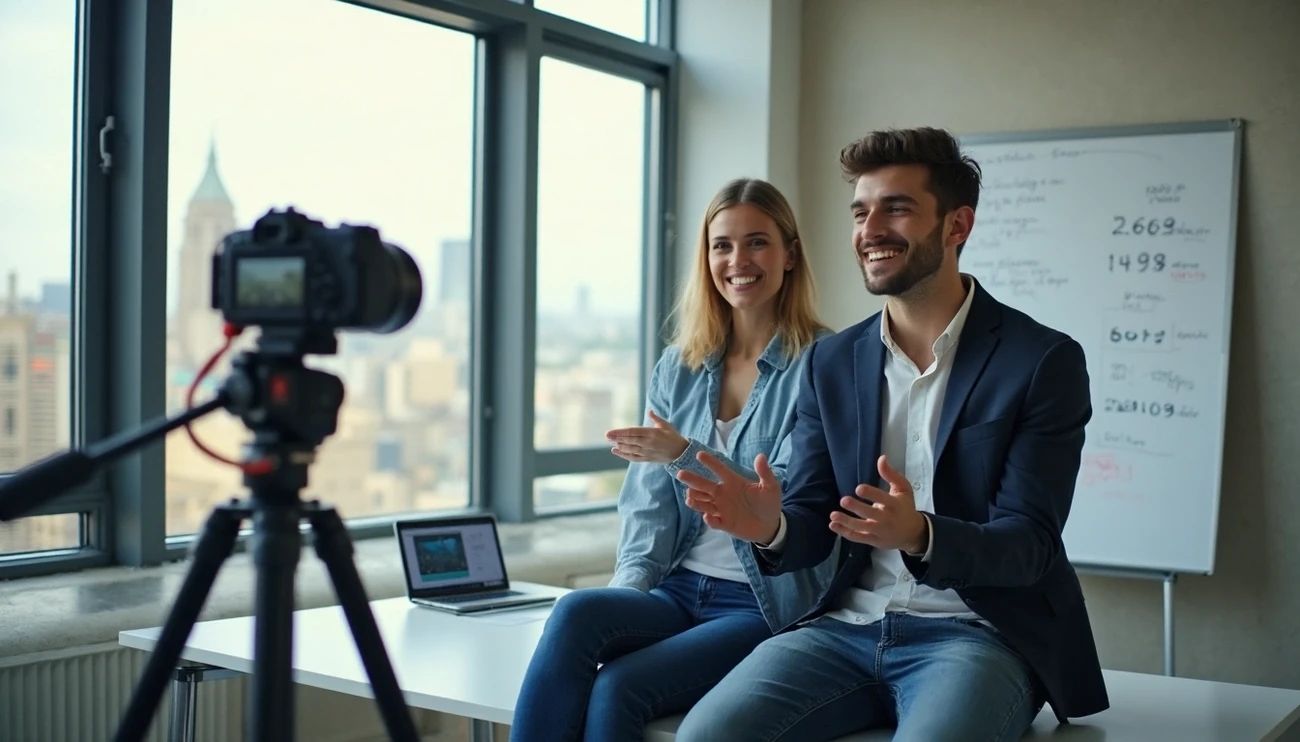Why Y Combinator Startup School Changed My Founder Journey [Real Results]
How I Found Y Combinator Startup School
My startup experience started on a random Tuesday night. I scrolled through tech news and stumbled upon Y Combinator Startup School - a completely free online program. The same accelerator that helped launch giants like Airbnb, Dropbox, and Reddit created this program.
The skepticism hit me first. Free stuff rarely brings value in the startup world. My research showed this wasn't just another entrepreneurship course. YC Startup School targets early-stage founders like me who build something new or want to turn a side project into a real company.
The track record grabbed my attention - 45% of companies in the most recent YC batch were former Startup School participants. That number alone made me sign up.
The program gave me three amazing resources:
The core team at YC shared direct advice from their decades of startup experience
YC's Co-Founder Matching Platform connected 16,000+ potential co-founders (they've helped make 33,000+ matches with a 25% acceptance rate)
Weekly update tools helped track growth and kept me accountable
The curriculum teaches everything from ideation to product development. It answers vital questions that first-time founders struggle with. The community aspect excited me most - connecting with other entrepreneurs who faced the same challenges.
Most resources focus on theory, but YC startup school emphasizes real-life applications. The Y Combinator startup school free program let me learn at my own speed. It needed just 1-2 hours weekly over about seven weeks.
Y Combinator Startup School makes startup knowledge available to everyone with internet access. YC democratizes the same advice that built billion-dollar companies. The YCombinator acceptance rate stays famously low, but this program helps everyone understand what YC wants in founders.
Finding Startup School became my first step to understanding how YC investment and YC funding decisions work. This knowledge revolutionized my approach to building a company.
Facing My Doubts as a First-Time Founder
"Don't worry about funding if you don't need it. Today, it's cheaper to start a business than ever before." — Noah Everett, Founder of Twitpic
I signed up for Startup School with high hopes. Reality hit me hard soon after. The excitement vanished and left me with a sinking feeling in my stomach. Who was I kidding?
Why I questioned if I was ready
Self-doubt crept in as I stared at my laptop screen. I had no technical co-founder, minimal funding, and zero startup experience. The numbers looked scary - approximately 70% of startups fail in their first year.
My mind raced with questions:
Was I just pretending to be an entrepreneur?
Did I have what it takes to compete with MBAs and technical founders?
Would anyone take me seriously?
This feeling has a name - imposter syndrome - that nagging sense you're a fraud who'll soon be exposed. Research shows this hits first-time founders especially hard when they tackle unfamiliar tasks like fundraising and product development.
What YC said about starting with no experience
Y Combinator Startup School tackled my fears head-on. Their curriculum made it clear that being new isn't always a drawback.
YC partners often point out that most successful founders didn't know what they were doing at first. The startup school materials highlighted how even Bill Gates went back to Harvard after starting Microsoft, not seeing its full potential.
The ycombinator acceptance rate might seem daunting, but their message rang clear: knowing how to learn and adapt matters more than past experience. They look for founders who show grit and problem-solving skills rather than perfect resumes.
The role of resilience in early-stage startups
Resilience isn't something you're born with - it's a skill you can build. Studies show that resilient entrepreneurs are 50% more likely to succeed long-term.
What does resilience look like day-to-day? It means:
Seeing setbacks as chances to learn
Building a strong network of mentors and peers
Taking time to reflect and keep things in viewpoint
YC's investment approach centers on this quality. They prefer founders who adapt quickly and tackle unexpected challenges while moving forward. I realized I should stop hiding my inexperience and see it as a chance to learn without any preconceptions.
Finding My Startup Idea the YC Way
I locked myself in my apartment for a weekend after my first month at Startup School. My goal was to brainstorm the "perfect startup idea." Here's a spoiler: it turned into a complete disaster.
Why forced brainstorming didn't work
Traditional brainstorming fails nearly 70% of the time. I spent hours generating ideas that led to a list of mediocre concepts. Nobody got excited about them—least of all me.
Y Combinator's philosophy stands clear: "The way to get startup ideas is not to try to think of startup ideas". This approach proves even more dangerous because it creates few good ideas and produces bad ones that seem just plausible enough to waste time.
I made the mistake of treating idea generation like a TV writer who creates fictional startup plots.
How I stumbled on a real problem worth solving
My breakthrough came unexpectedly when I faced frustrating scheduling software issues. The data shows that approximately 70% of YC's top companies found their ideas organically rather than through forced brainstorming.
Y Combinator defines these as "organic startup ideas"—problems that founders notice naturally through their experiences.
Learning to observe problems in my own life
Startup school materials taught me to focus on noticing problems instead of trying to think them up. The materials highlighted three key traits of great startup ideas:
Something you personally want
Something you can build
Something few others realize is worth doing
This new perspective changed everything. I began spotting daily problems instead of chasing imaginary unicorn concepts.
Building and Launching My First MVP
The time came to build something tangible after identifying my idea. Startup School's curriculum emphasized a significant point: launch faster than feels comfortable.
What I learned about minimum viable products
Y Combinator describes an MVP as "that version of a new product which allows a team to collect the maximum amount of validated learning about customers with the least effort". The goal wasn't building a perfect product—we needed to learn quickly.
YC taught me three core MVP principles:
Focus exclusively on core functionality
Launch in weeks, not months
Accept imperfection as a valuable learning tool
How I got my first users
My approach followed YC's playbook. A simple landing page explained my solution that I shared with a small group of 10-20 target users. The statistics show that 90% of startups fail because they don't meet their audience's needs or adapt to market changes.
Iterating based on real feedback
The launch phase introduced what startup school calls the "build-measure-learn" cycle. This method reduced the feedback gap between idea and user reaction. My team could:
Observe actual user behavior
Gather direct feedback
Make evidence-based decisions
Why perfection was the enemy of progress
My progress stalled because of perfectionism. The costs of seeking perfection remained hidden—delayed market entry, increased development costs, and missed opportunities for user feedback.
The YC startup school free program taught me to set a firm 90-day development timeline and prioritize validation over flawlessness. A YC partner said it best: "Launch something bad, quickly".
What Changed After Startup School
"Chase the vision, not the money. The money will end up following you." — Tony Hsieh, Founder of LinkExchange and Former CEO of Zappos
Y Combinator's startup school program became a game-changer in my startup experience. The changes reshaped my entire approach to startups, way beyond the reach and influence of just learning new things.
My mindset shift around failure
Failure used to terrify me before startup school. Now I see it as valuable data. YC teaches founders to:
Stay flexible and open-minded about their approach
Learn from setbacks instead of sticking to one solution
Move quickly and show the most important progress based on time invested
How co-founder matching helped me
My biggest challenge was finding the right partner until I found that there was YC's co-founder matching platform. This free service helped me connect with potential co-founders who went together with one another with my skills.
The platform's success stories speak volumes—two matched co-founder pairs made it into YC's Summer 2021 batch just months after meeting. This gave me the confidence to explore partnerships I never thought possible.
Understanding the YC investment mindset
Startup school helped me learn about YC's founder review process. They invest $500,000 for about 7% equity, but they value much more than just numbers:
Strong, balanced teams with technical know-how
Teams ready to work full-time on their idea
Teams who tell their product story clearly and briefly
Applying to YC: What I learned from the process
The application taught me valuable lessons. YC partners keep emphasizing two main things:
Building the product
Talking to customers
How I now think about the ycombinator acceptance rate
The ycombinator acceptance rate (about 1.5%) used to scare me. My viewpoint has changed—all but one of these companies accepted had applied multiple times. On top of that, YC often rejects founders they later accept.
This makes me see the whole experience as a journey of constant improvement rather than instant validation.
Looking Back: Was It Worth It?
Y Combinator Startup School changed my startup trip way beyond my original expectations. This free program seemed too good to be true at first. Yet it completely changed how I build my business now.
Here's what stuck with me the most:
You should welcome imperfection - a 70% solution beats waiting forever for that perfect 100%
A change from fearing failure to seeing it as valuable data - just like 90% of successful founders do
Finding problems naturally instead of forcing ideas - exactly what all but one of YC's top companies did
Meeting potential co-founders on a platform that has helped create 33,000+ matches
That intimidating 1.5% YC acceptance rate used to scare me. Now I look at it differently. About half the companies they accept had to try multiple times before getting in. This change in viewpoint made the whole trip worth it.
The program showed me that success doesn't need all the answers on day one. Quick iteration, real user feedback, and staying strong through setbacks matter more. I learned something amazing - even founders who built billion-dollar companies started right where I am now. They were confused and uncertain but determined to create something valuable.
Starting without technical experience scared me. Yet YC's focus on quick learning rather than knowing everything gave me the push I needed. People love to talk about overnight success stories in the startup world. But they hide the messy parts. Startup School showed me the ground truth about moving forward.
My founder trip continues past this program. YC's practical framework helps me move ahead with more confidence and clarity. The question isn't "Can I build a successful startup?" anymore. It's "How fast can I learn from each try?"
Here's my simple advice to anyone who wants to try this program: sign up now. The mix of world-class teaching, peer support, and practical tools makes it maybe the best free resource you'll find as an early-stage founder. Trust me - you'll thank yourself later.
Key Takeaways
Y Combinator Startup School offers a proven framework for transforming entrepreneurial ideas into viable businesses, with 45% of recent YC batch companies being former participants.
• Start before you feel ready - YC emphasizes that inexperience isn't a disadvantage; resilience and quick learning matter more than perfect credentials or technical backgrounds.
• Find problems organically, not through forced brainstorming - 70% of YC's top companies discovered ideas naturally through personal experiences rather than artificial ideation sessions.
• Launch imperfect MVPs quickly - Focus on core functionality and gather real user feedback within 90 days rather than pursuing perfection that delays market validation.
• Embrace failure as valuable data - Shift from fearing setbacks to viewing them as essential learning opportunities that guide product iteration and improvement.
• Leverage YC's free resources strategically - The co-founder matching platform has facilitated 33,000+ connections, while the curriculum provides actionable frameworks used by billion-dollar companies.
The program's greatest value lies in its mindset transformation - teaching founders to prioritize rapid learning cycles over theoretical perfection, ultimately building the resilience needed for long-term startup success.
FAQs
Q1. What is Y Combinator Startup School and how can it benefit entrepreneurs? Y Combinator Startup School is a free online program that provides early-stage founders with valuable resources, including advice from experienced YC partners, access to a co-founder matching platform, and tools to track growth. It offers practical knowledge on building startups and can significantly improve a founder's chances of success.
Q2. How does Y Combinator Startup School help first-time founders overcome their doubts? The program addresses common concerns of inexperienced founders by emphasizing that prior experience is less important than the ability to learn quickly and adapt. It teaches founders to view setbacks as learning opportunities and focuses on developing resilience, which is crucial for long-term success in the startup world.
Q3. What approach does Y Combinator recommend for finding startup ideas? Y Combinator advises against forced brainstorming and instead encourages founders to identify problems organically through personal experiences. They emphasize looking for ideas that you personally want, can build, and that few others realize are worth pursuing.
Q4. How does Y Combinator Startup School approach building and launching MVPs? The program teaches founders to focus on core functionality and launch quickly, even if the product feels imperfect. It emphasizes gathering real user feedback within 90 days and iterating based on that feedback, rather than pursuing perfection that delays market validation.
Q5. What are some key takeaways from participating in Y Combinator Startup School? Participants often experience a mindset shift around failure, viewing it as valuable data rather than something to be feared. The program also helps founders understand YC's investment philosophy, improves their ability to tell their startup's story concisely, and provides valuable networking opportunities with other entrepreneurs and potential co-founders.









